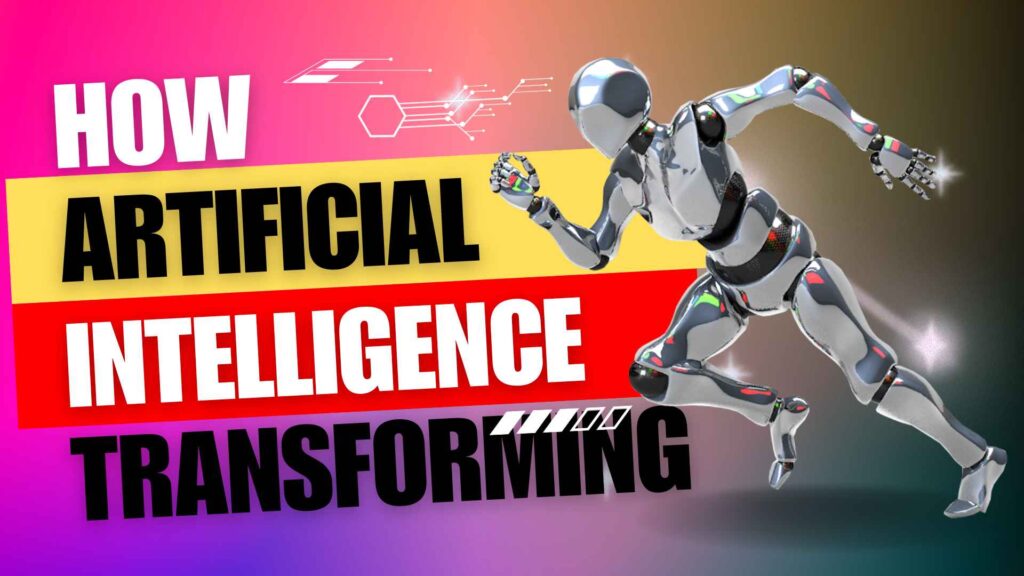In today’s rapidly evolving digital age, it’s no secret that technology has been a driving force behind many innovations in the business world. One of the most significant technological advancements of our time is Artificial Intelligence (AI). AI is revolutionizing the way businesses operate, making processes more efficient, improving decision-making, and enhancing customer experiences. In this article, we will explore How Artificial Intelligence is Transforming The World.
Understanding the Basics of Artificial Intelligence
Before delving into How Artificial Intelligence is Transforming The World, it’s important to grasp the fundamentals of AI. At its core, AI refers to the development of computer systems that can perform tasks typically requiring human intelligence. This includes tasks like problem-solving, learning from experience, and adapting to new information. AI encompasses various technologies, including machine learning, natural language processing, and computer vision.
The Rise of Data-Driven Decision Making
AI’s biggest contribution to the business world lies in its ability to make sense of vast amounts of data. Businesses generate an enormous volume of data daily, and AI can analyze this data faster and more accurately than any human. This analysis provides valuable insights into consumer behavior, market trends, and operational efficiency, allowing companies to make data-driven decisions that give them a competitive edge.
Enhanced Customer Experiences
In a highly competitive market, providing exceptional customer experiences is vital. AI-driven chatbots and virtual assistants are transforming customer service by providing instant responses to queries and offering personalized recommendations. This not only saves time and resources but also enhances customer satisfaction, leading to higher retention rates.
The Power of Predictive Analytics
Predictive analytics is another area where AI is making significant strides. By analyzing historical data and identifying patterns, AI systems can predict future trends, helping businesses plan and strategize accordingly. This is invaluable for industries such as finance, where predicting market trends can make or break investments.
Automation and Efficiency
The automation capabilities of AI are reshaping industries across the board. From manufacturing to logistics, businesses are utilizing AI-powered robots and machines to streamline operations and increase productivity. This not only reduces costs but also minimizes errors, resulting in a more efficient and reliable workflow.
The Role of AI in Marketing
Marketing is one of the areas where AI’s impact is most pronounced. Marketers are leveraging AI to target specific demographics, optimize ad campaigns, and analyze customer behavior. This not only saves marketing dollars but also improves the ROI of advertising investments.
AI in Healthcare
The healthcare sector is benefiting from AI in numerous ways, from diagnosing diseases to drug discovery. Machine learning algorithms can process medical data more efficiently than ever, leading to more accurate diagnoses and personalized treatment plans.
The Ethical and Legal Implications
While AI offers immense potential, it also raises ethical and legal questions. Issues concerning data privacy, bias in AI algorithms, and job displacement due to automation need to be addressed. Companies are increasingly aware of these concerns and are working towards ethical AI implementation.
Preparing for the AI-Driven Future
As AI continues to evolve and integrate into various industries, businesses need to adapt to stay competitive. This means investing in AI technologies, training employees in AI-related skills, and developing AI strategies to harness its full potential.
Challenges and Future Prospects
As with any technological advancement, AI comes with its set of challenges. Ensuring data security, addressing the digital divide, and managing the impact on the job market are among the hurdles businesses and society must navigate. Nevertheless, the future prospects of AI are bright, with ongoing innovations poised to transform industries even further.
Conclusion
In conclusion, the impact of AI on the business world cannot be overstated. It has already transformed various aspects of business operations, from data analysis to customer service and marketing. AI’s potential is vast, and as it continues to advance, businesses that embrace it will undoubtedly gain a competitive advantage. However, ethical considerations and addressing potential challenges are crucial as we move towards an AI-driven future. By harnessing the power of AI while maintaining ethical standards, businesses can pave the way for a more efficient, innovative, and technologically advanced future.






